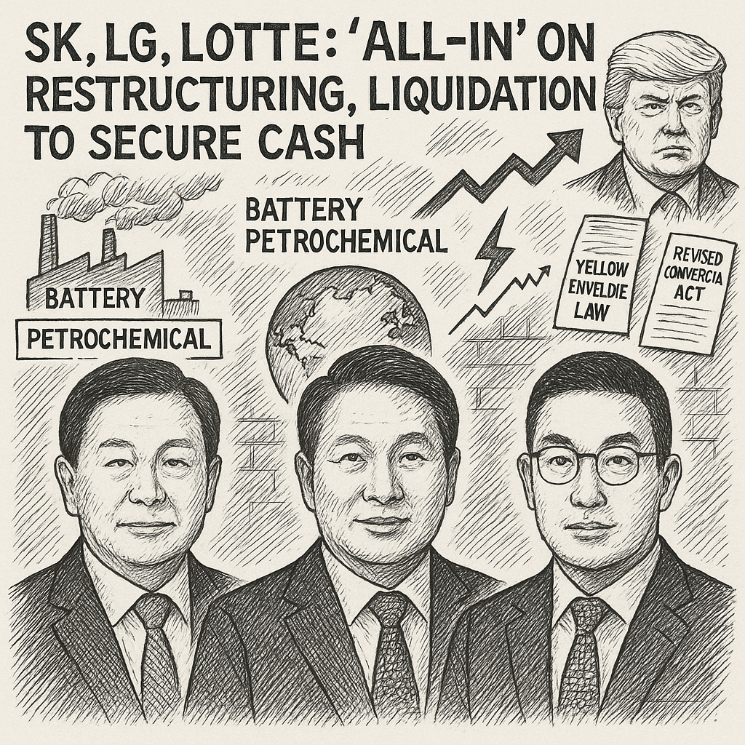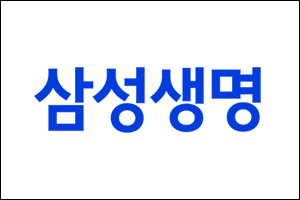SK, Lotte Initiate 'Cash Preservation Battle'
SK Group is extensively carrying out rebalancing (portfolio adjustment), including streamlining overlapping businesses among affiliates and divesting non-core assets. In March, SK Inc. significantly reduced its financial burden by selling an 85% stake in SK Specialty to private equity firm Hahn & Company for approximately KRW 2.6 trillion. Last month, it divested all its shares in Vietnam's VinGroup through a staggered third-party sale.This marked the full recovery of investments made by major SK affiliates in Vietnam through the jointly invested SK Southeast Asia Vietnam Investment Corporation in 2019. An estimated amount in the early to mid-KRW 1 trillion range was recouped, roughly at the level of the initial investment. Furthermore, the sale of SK Siltron, a semiconductor wafer manufacturing subsidiary, is also being pursued. SK Inc. expects SK Siltron's enterprise value to exceed KRW 5 trillion.
LOTTE, whose credit rating was even downgraded after a liquidity crisis last year, is more committed to cash securing than any other domestic group. The challenge lies in the retail sector, including department stores and hypermarkets, which is primarily domestic-focused and offers limited upside. Lotte Chemical, which heavily expanded facilities during the boom, is struggling with cash generation after being directly hit by the petrochemical downturn originating from China.
Lotte Chemical has initiated securing KRW 2.3 trillion in cash through asset sales in the US, Pakistan, and Indonesia. The group is also making an all-out effort to secure cash by even collateralizing Lotte World Tower, a core group asset, with banks. Hotel Lotte, acting as the holding company, sold Lotte Rental for KRW 2.8 trillion at the end of last year.
LG Group is proactively responding to the crisis through selection and concentration. LG Display sold its 8.5-generation large LCD factory in Guangzhou, China, to TCL CSOT for approximately USD 1.5 billion. LG H&H is pursuing the sale of Haitai htb, its beverage subsidiary, to strengthen its core cosmetics business competitiveness.
Some industry observers analyze that LG H&H is even considering the sale of Coca-Cola (Korea Bottling Co.). LG Chem also divested its Water Solution business (KRW 1.4 trillion) and Aesthetics business including fillers (KRW 200 billion) this year. The Water Solution business was a profitable venture that earned KRW 65 billion in EBITDA last year, and the Aesthetics business was proactively divested despite expectations for future growth, to improve the financial situation shaken by the petrochemical downturn. LG Chem also plans to sell a portion of its shares in LG Energy Solution.
Hanwha Group is heavily benefiting from the defense industry boom, but simultaneously grappling with raising funds to support its petrochemical affiliates. According to the financial investment industry, as of the end of June, maturing debts within one year amount to KRW 2.8 trillion, including KRW 1.825 trillion for Hanwha Solutions, KRW 650 billion for Hanwha TotalEnergies, and KRW 335 billion for Yeochun NCC.
While stopgap measures like borrowings, capital increases, and loans are being used, fundamental solutions for the deficit structure are urgently needed. Hanwha Group is reportedly considering options like divesting its stake in Korea Zinc to raise funds. Hanwha possesses an 8% stake in Korea Zinc through Hanwha Corporation, Hanwha Impact, and Hanwha Power Systems Global.
Companies Beset by Internal and External Woes
The current situation where domestic conglomerates are pursuing restructuring and liquidity securing did not arise suddenly. After the COVID-19 pandemic, excessive optimism about petrochemicals, electric vehicles, and batteries encouraged large corporations to expand capital expenditures.These large-scale capital expenditures were mostly financed through external borrowings, and with interest rates solidifying at high levels in recent years, financial costs have surged, exacerbating corporate financial burdens. An industry official explained, "As the downturn lengthens, it has become difficult to repay maturing bonds. Companies have no choice but to focus on divesting unnecessary businesses and defending cash liquidity." Indeed, the semiconductor, display, and petrochemical sectors have been grappling with prolonged stagnation due to the global oversupply from China, posing difficulties for Korean companies.
Furthermore, US President Trump's 'America First' policy, aimed at 'Make America Great Again (MAGA)', has amplified global economic uncertainty. Analysts suggest that the restructuring of US subsidy policies, including reciprocal and product-specific tariffs and the Inflation Reduction Act (IRA), along with strengthened protectionism, has left domestic conglomerates with no choice but to engage in a 'cash preservation battle'.
Moreover, it is pointed out that various laws and regulations, inevitably having a detrimental impact on overall business activities, are driving companies to the brink in this deteriorating global environment.
The Korea Employers Federation recently held an urgent press conference, appealing to the government and ruling party for careful handling, stating that "the Yellow Envelope Law and the revised Commercial Act are hindering the management and investment of domestic companies."
An industry official remarked, "The expansion of collective bargaining rights for primary and subcontracting companies could lead to indiscriminate spread of strikes, and mandatory cumulative voting could lead to intensifying management disputes and an influx of foreign speculative capital, raising concerns about adverse effects. A major problem is the lack of specific countermeasures beyond government guidelines."
Gwak Horyung (horr@fntimes.com)































![‘리니지 제국'의 부진? 엔씨의 저력을 보여주마 [Z-스코어 기업가치 바로보기]](https://cfnimage.commutil.kr/phpwas/restmb_setimgmake.php?pp=006&w=69&h=45&m=5&simg=2026020123095403419dd55077bc211821821443.jpg&nmt=18)

![[DCM] 한화시스템, FCF 적자 불구 시장조달 자신감](https://cfnimage.commutil.kr/phpwas/restmb_setimgmake.php?pp=006&w=69&h=45&m=5&simg=2026020204171101504a837df6494123820583.jpg&nmt=18)















![[그래픽 뉴스] 워킹맘이 바꾼 금융생활](https://cfnimage.commutil.kr/phpwas/restmb_setimgmake.php?pp=006&w=298&h=298&m=1&simg=202602021638156443de68fcbb3512411124362_0.jpg&nmt=18)
![[그래픽 뉴스] 매파·비둘기부터 올빼미·오리까지, 통화정책 성향 읽는 법](https://cfnimage.commutil.kr/phpwas/restmb_setimgmake.php?pp=006&w=298&h=298&m=1&simg=202601281456119025de68fcbb3512411124362_0.jpg&nmt=18)
![[그래픽 뉴스] 하이퍼 인플레이션, 왜 월급이 종잇조각이 될까?](https://cfnimage.commutil.kr/phpwas/restmb_setimgmake.php?pp=006&w=298&h=298&m=1&simg=202601141153149784de68fcbb3512411124362_0.jpg&nmt=18)
![[그래픽 뉴스] 주식·채권·코인까지 다 오른다, 에브리싱 랠리란 무엇일까?](https://cfnimage.commutil.kr/phpwas/restmb_setimgmake.php?pp=006&w=298&h=298&m=1&simg=202601071630263763de68fcbb3512411124362_0.jpg&nmt=18)
![[그래픽 뉴스] “이거 모르고 지나치면 손해입니다… 2025 연말정산 핵심 정리”](https://cfnimage.commutil.kr/phpwas/restmb_setimgmake.php?pp=006&w=298&h=298&m=1&simg=202601061649137526de68fcbb3512411124362_0.jpg&nmt=18)
![[신간] 고수의 M&A 바이블](https://cfnimage.commutil.kr/phpwas/restmb_setimgmake.php?pp=006&w=81&h=123&m=5&simg=2025091008414900330f8caa4a5ce12411124362.jpg&nmt=18)
![[신간] 리빌딩 코리아 - 피크 코리아 극복을 위한 생산성 주도 성장 전략](https://cfnimage.commutil.kr/phpwas/restmb_setimgmake.php?pp=006&w=81&h=123&m=5&simg=2025032814555807705f8caa4a5ce12411124362.jpg&nmt=18)
![[서평] 추세 매매의 대가들...추세추종 투자전략의 대가 14인 인터뷰](https://cfnimage.commutil.kr/phpwas/restmb_setimgmake.php?pp=006&w=81&h=123&m=5&simg=2023102410444004986c1c16452b0175114235199.jpg&nmt=18)


![[신간] 이게 화낼 일인가?](https://cfnimage.commutil.kr/phpwas/restmb_setimgmake.php?pp=006&w=81&h=123&m=5&simg=2026010610254801367f8caa4a5ce12411124362.jpg&nmt=18)

![[AD] 현대차, 글로벌 안전평가 최고등급 달성 기념 EV 특별 프로모션](https://cfnimage.commutil.kr/phpwas/restmb_setimgmake.php?pp=006&w=89&h=45&m=1&simg=20260106160647050337492587736121125197123.jpg&nmt=18)
![[AD] 현대차 ‘모베드’, CES 2026 로보틱스 부문 최고혁신상 수상](https://cfnimage.commutil.kr/phpwas/restmb_setimgmake.php?pp=006&w=89&h=45&m=1&simg=20260105103413003717492587736121125197123.jpg&nmt=18)
![[AD] 기아 ‘PV5’, 최대 적재중량 1회 충전 693km 주행 기네스 신기록](https://cfnimage.commutil.kr/phpwas/restmb_setimgmake.php?pp=006&w=89&h=45&m=1&simg=20251105115215067287492587736121125197123.jpg&nmt=18)
![[카드뉴스] KT&G, 제조 부문 명장 선발, 기술 리더 중심 본원적 경쟁력 강화](https://cfnimage.commutil.kr/phpwas/restmb_setimgmake.php?pp=006&w=89&h=45&m=1&simg=202509241142445913de68fcbb3512411124362_0.png&nmt=18)
![[AD]‘황금연휴에 즐기세요’ 기아, ‘미리 추석 페스타’ 이벤트 실시](https://cfnimage.commutil.kr/phpwas/restmb_setimgmake.php?pp=006&w=89&h=45&m=1&simg=20250903093618029117492587736121166140186.jpg&nmt=18)



